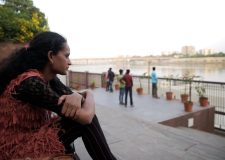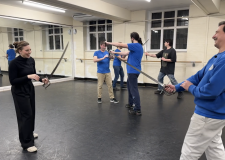Reclaim the Night marches against sexual violence and for rape justice in Brighton
By Jess Staufenberg
More than 400 people took to the streets in a protest against harassment and sexual violence in Brighton last night (Saturday 15 November).
The Reclaim the Night march in Brighton is part of a nationwide movement during November dating back to the first march by women in Leeds in 1977.
Frankie Hall, 22, volunteer, said that by marching as a visible group people can reclaim their right to be on the streets without feeling scared or uncomfortable.
Frankie said: “People feel very unsafe at night where the clubs are in Brighton because lots of drunk men come and give you a hard time for existing.
“Particularly in Brighton, where we have a high trans population, we are often subjected to transphobic cat calls and street violence.”
 The march was organised by the Brighton Feminist Collective whose website describes it as a “sex positive, pro-choice, trans inclusive and anti exploitation feminist activist group” begun in 2011.
The march was organised by the Brighton Feminist Collective whose website describes it as a “sex positive, pro-choice, trans inclusive and anti exploitation feminist activist group” begun in 2011.
At least five rapes have been reported in Brighton in the past few weeks. And earlier this month a man was jailed for his part in a gang that forced young trafficked Hungarian women to work in a brothel at the Sussex University campus.
One of the protesters, Shona McCulloch, 27, said that she had returned to Brighton and noticed an upswing in the amount of harassment she experienced on the streets.
Shona said: “I’ve just been back for 24 hours and in the space of 10 minutes walking down the street I’ve been shouted at by three men out of cars.
“The atmosphere here, especially around West Street, feels slightly more hostile as a woman than it did do a few years ago.”
The march originated in the 1970s when Peter Sutcliffe was murdering sex workers.
Brighton Feminist Collective organiser Caitlin Hayward-Tapp, 24, said that the march had a history of picketing lapdancers clubs and condemning sex workers which needs to be overcome.
Caitlin said: “I think one of the things that’s quite different about us is we make it very explicit that the march is open to all genders, to the trans community and to sex workers.
“I think inclusivity of the march is an ongoing process. It’s very difficult to battle its history as not welcoming so that’s our priority in the coming years.”
Another protester Beth Granter, 32, wants change in a tangible form through ensuring sex education lessons are kept in schools and funding is made available for women’s crisis centres.
Shona McCulloch said that Brighton University and Sussex University should follow the example of Oxford and Cambridge in introducing affirmative consent classes for students.
Asked about the evening, Shona said: “There’s something so empowering about coming to this march and seeing how many numbers we’ve got.
“In activism you can feel like you’re struggling on your own. This changes that.”
For more information visit www.brightonfeministcollective.org.uk.





















